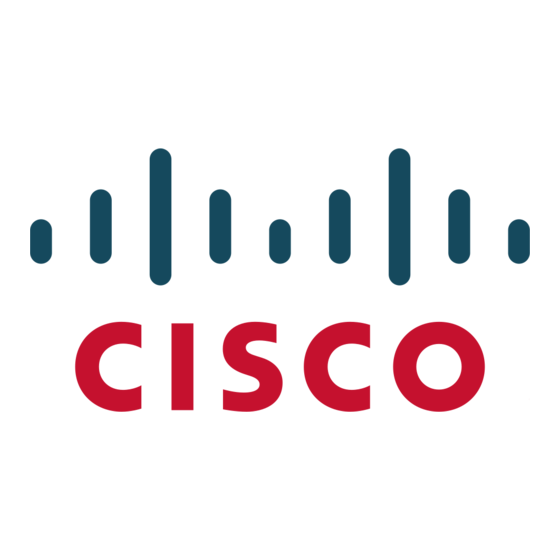Cisco 1760V Rozwiązywanie problemów ze sprzętem - Strona 10
Przeglądaj online lub pobierz pdf Rozwiązywanie problemów ze sprzętem dla Router sieciowy Cisco 1760V. Cisco 1760V 12 stron. Cabling and installation
Również dla Cisco 1760V: Skrócona instrukcja obsługi (13 strony)

Cisco - Hardware Troubleshooting for Cisco 1700 Series Routers
Consequently, the troubleshooting steps are simple. For example, if a router is connected to a switch, the
troubleshooting steps would be:
1. Replace the cable.
2. If this does not solve the problem, try another port on the switch.
3. If the problem persists, replace the router.
In a shared environment, the source of the problem is a lot harder to find. Every piece of hardware that
makes up the shared segment can be the cause. All components (cables, connectors, and so on) have to
be tested one by one.
Ignored Packets
router#show interfaces ethernet 0
Ethernet0/0 is up, line protocol is up
...
21 input errors, 0 CRC, 0 frame, 0 overrun, 21 ignored
Packets are ignored if there are no free buffers to accept the new packet. This can happen if the router is
overloaded with traffic, but can also happen if the interface is faulty. If "ignores" are present on all
interfaces, then the router is probably overloaded with traffic, or doesn't have sufficient free buffers in
the pool that match the maximum transmission unit (MTU) on interfaces. In the latter case, an increment
of the ignored counter is followed by an increment of the no buffer counter:
router#show interfaces serial 0
...
1567 packets input, 0 bytes, 22 no buffer
22 input errors, 0 CRC, 0 frame, 0 overrun, 22 ignored, 0 abort
You may also see an increase in the buffer failures counter in the pool that matches the MTU size:
router#show buffers
...
Big buffers, 1524 bytes (total 50, permanent 50):
50 in free list (5 min, 150 max allowed)
3066 hits, 189 misses, 0 trims, 24 created
12 failures (0 no memory)
The number of preconfigured permanent, free, and maximum allowed buffers may not be completely
compatible for every environment. You can read more about this and how to avoid it in
If "ignores" are only increasing on one interface and are not followed by an increment of the no buffer
counter, and the interface is not heavily loaded, then this interface could be faulty. In that case, capture
the output of the show technical-support command and contact the TAC. The load on the interface can
be viewed in the output of the show interfaces command:
router#show interfaces serial 0
...
reliability 255/255, txload 100/255, rxload 122/255
http://kbase:8000/paws/servlet/ViewFile/17959/hwts_1700_17959.xml?convertPaths=1
Page 10 of 12
Buffer
Tuning.
01/10/2004
